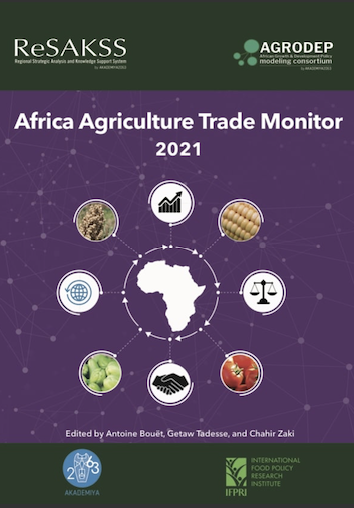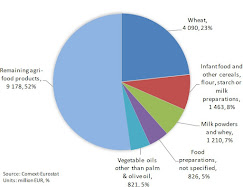- The report finds that many African countries continue to enjoy the most success in global markets with cash crops and niche products. At the intra-African level, countries are becoming more interconnected in trade of key commodities, but there remain many potential but unexploited trade relationships.
- The report examines the livestock sector in detail, finding that despite its important role in Africa, the sector is concentrated in low value- added products that are informally traded.
- The report also examines trade integration in the Arab Maghreb Union (AMU), which remains limited due to factors including tariffs, nontariff measures, poor transport infrastructure, and weak institutions.
- Finally, the report discusses the implications of two major events affecting African trade in 2020 and 2021: the COVID-19 pandemic and the implementation of the African Continental Free Trade Area (AfCFTA).
10 September 2021. AGRF 2021 Summit - Launch of 2021 Africa Agriculture Trade Monitor (AATM)
Session participants discussed the research findings and policy recommendations of the 2021 AATM, an annual publication dedicated to addressing intra-African agricultural trade and informing AfCFTA implementation.
- Ms. Sara Mbago-Bhunu Director, East and Southern Africa Division, International Fund for Agricultural Development (IFAD)
- Dr. Godfrey Bahiigwa Director, Agriculture & Rural Economy and Agriculture, African Union Commission, Ethiopia
- Dr. James Oehmke Acting Division Chief, Bureau for Resilience and Food Security, U.S. Agency for International Development (USAID), USA
- Dr. Ousmane Badiane Executive Chairperson, AKADEMIYA 2063 Highlights of the Africa Agriculture Trade Monitor (Yara Prize Winner, 2015), Senegal
- Dr. Johan Swinnen Director General, International Food Policy Research Institute (IFPRI) & Global Director, Systems Transformation, CGIAR, USA
- Dr. Silver Ojakol Chief of Staff, African Continental Free Trade Area (AfCFTA) Secretariat, Ghana
- Dr. Maximo Torero Cullen Chief Economist, FAO, Italy
- Dr. Heike Hoeffler Project Lead, Agricultural Trade, Agribusiness, Deutsche Gesellschaft für Internationale Zusammenarbeit (GIZ), Germany
- Dr. Fadel Ndiame Deputy President, Alliance for a Green Revolution in Africa (AGRA)
Related:
10 September 2021. AGRF 2021 Summit - Breaking the Barriers to Trade for Stronger Food and Nutrition Security in Africa
10 September 2021. AGRF 2021 Summit - Breaking the Barriers to Trade for Stronger Food and Nutrition Security in Africa
The Food Trade Coalition for Africa hosted two sessions during the AGRF 2021 Summit focused on 1) Removing Barriers to Regional Trade in Food Staples and 2) Building Robust Data Systems: The Regional Food Balance Sheet.
Panel 1: Breaking the Barriers to Trade for Stronger Food and Nutrition Security in Africa
In order for the African Continental Free Trade Area (AfCFTA) to be successfully implemented, African countries will need significant investments in building robust data systems to generate data and information for decision-making. Early warning systems for food and nutrition security are needed to provide alerts on a frequent basis, showing potential areas of surplus and deficits. This will enable different stakeholders to prepare in averting crises, and especially for the private sector to move food from areas of surplus to areas of deficit.
- Mr. Jonathan Said Head of Inclusive Growth and Private-Sector Development Practice, Tony Blair Institute for Global Change
- Hon. Betty Maina Cabinet Secretary, Ministry of Industrialization, Trade and Enterprise Development, Kenya
- H.E. Mr. Wamkele Mene Secretary General of the African Continental Free Trade Area Secretariat
- Dr. Jewel Bronaugh Deputy Secretary, US Department of Agriculture, USA
- Dr. Bright Okogu Chief of Staff to the Director General, World Trade Organization
- Mr. Melvin Spreij Head, Standards and Trade Development Facility (STDF), World Trade Organization
- Mr. Gerald Masila Executive Director, Eastern Africa Grain Council, Kenya
- Ms. Fatma Ben Rejeb Chief Executive Officer, Pan African Farmers Organization (PAFO)
Panel 2: Building Strong Food Systems through Inclusive Data Sharing
- Moderator Dr. Nalishebo Meebelo Senior Program Coordinator, Regional Network of Agriculture Policy Research Institutes (ReNAPRI) Secretariat
- Keynote Address: Hon. Alan Kyerematen, Minister of Trade and Industry; Ghana
- Keynote Address: Hon. Adan Mohammed, The Cabinet Secretary, Ministry of East African Community and Northern Corridor Development, Kenya
- Keynote Address: H.E Chileshe Kapwepwe, Secretary General, COMESA, Zambia
- Dr. Ade Freeman Africa Regional Programme Leader, Regional Office for Africa, Food and Agriculture Organisation
- Mr. Mansoor Ahmad Team Lead Africa Agri-business Impact Investment & Regional Food Trade at the UK’s Foreign, Commonwealth and Development Office
- Dr. Beth Dunford Vice President for Agriculture, Human and Social Development, African Development Bank Group
Related: EU Agri-food trade in 2020 report
8 September 2021. 2020 marked EU's leading position among the world's biggest exporters of agri-food products. On the import side, the EU has become the third largest importer after the United States and China.With total EU agri-food exports valued at €
17.6 billion and imports valued at € 16.5 billion in
2020, African countries are important destinations
for EU exports (9.5% of all EU agri-food exports) and
origin for its imports (7% of total EU agri-food
imports), although with very different trade pattern
across African regions and countries, for instance for
North Africa or the Sub Saharan countries. (page 28)
Looking at different classes of products , EU exports
to Africa are dominated by ‘commodities’ with a
44% share. Important shares also represent food preparations (21%) and other primary products (17%). Processed food account for 8%, while beverages and non-edible products- 5% each. By contrast, in the basket of EU imports from African countries, ‘commodities’ dominate together with ‘other primary products’ and account for 43% and 38% of EU agri-food purchases, respectively. Nonedible products (11%) and processed food (7%) follow in the list. Food preparations account for only 2%, while imports of beverages are minimal. (page 29)
The basket of EU agri-food exports to Africa is clearly dominated by wheat with a share of 23%. Infant food and other cereals as well as milk powders and whey follow in the list with shares 7-8%, each. Food preparations, rapeseed and sunflower oils account for a similar share of 5%, each. Out of remaining agrifood exports, important products include poultry meat, vegetables, live animals, pet food, and coarse grains – each accounting for a share of around 3%. (page 29) 44% share. Important shares also represent food preparations (21%) and other primary products (17%). Processed food account for 8%, while beverages and non-edible products- 5% each. By contrast, in the basket of EU imports from African countries, ‘commodities’ dominate together with ‘other primary products’ and account for 43% and 38% of EU agri-food purchases, respectively. Nonedible products (11%) and processed food (7%) follow in the list. Food preparations account for only 2%, while imports of beverages are minimal. (page 29)




No comments:
Post a Comment